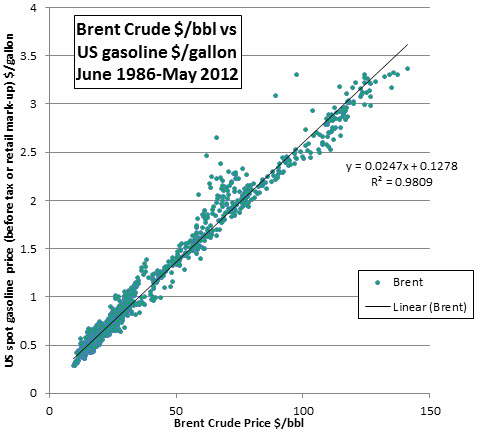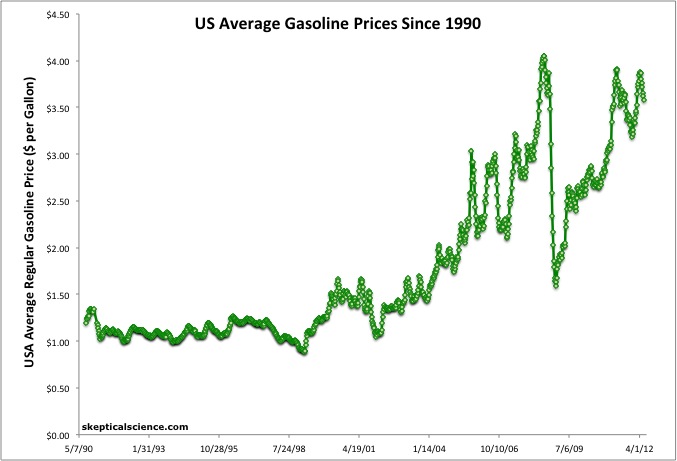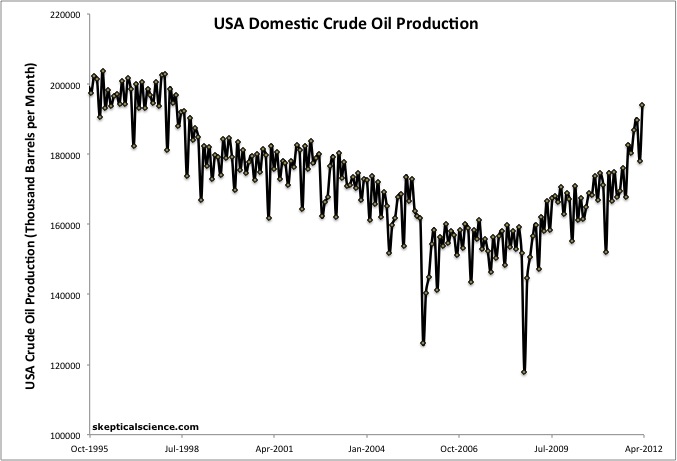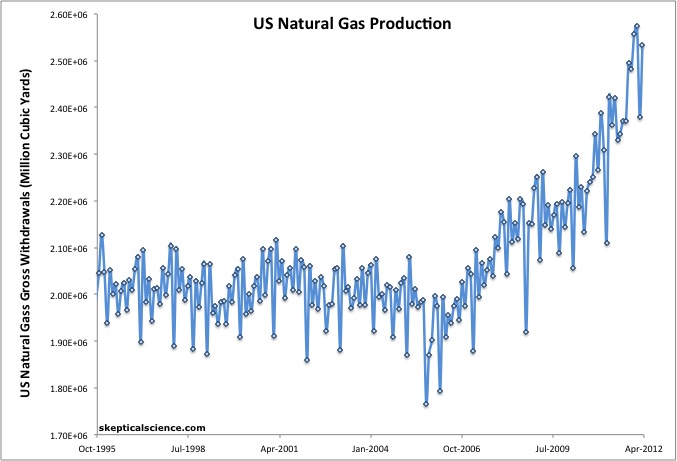Fred Singer Promotes Fossil Fuels through Myths and Misinformation
Posted on 8 June 2012 by dana1981
Climate contrarians have been busy lately. In the past few weeks we've seen two Gish Gallops from Australian geologists (one of which was extremely politically-charged), a gross distortion of reality from another geologist (this one an American), and now we have yet another politically-charged article from another climate contrarian - Fred Singer, who John Mashey documented was linked to the Climate Research 'pal review' scandal through his connections with the 'pal review' authors via various fossil fuel-funded political think tanks.
In this case, Singer has written a pro-Mitt Romney (the US Republican Party 2012 presidential nominee) editorial, essentially pleading with Romney to pursue an exclusively fossil fuel-based energy policy. As we will see here, Singer's arguments are based on a number of energy-related myths, as well as climate-related conspiracies.
Singer Invokes Inhofe of all People
Although it was somewhat buried in his editorial, we should start off by highlighting Singer's lone science-related statement, which invoked Senator James Inhofe of all people:
"Romney should speak out on the “hoax” (to use Senator Inhofe’s term) of climate catastrophes from rising CO2 levels."
As we noted when discussing Ian Plimer's Gish Gallop and John Mashey's pal review research, conspiracy theories are one of the five characteristics of scientific denialism, and few people embody the climate conspiracy theory better than James Inhofe. Thus it's puzzling why Singer would defer to Inhofe on his only science-related comment in this article.
Regardless, as with his climate contrarian colleagues, Singer is displaying the characteristics of scientific denial here. Catastrophic climate change consequences are an entirely plausible scenario, and even a highly probable one if we follow Singer's advice and rely exclusively on fossil fuels to meet our energy needs.
Oil and Gas Prices - Singer Myths vs. Reality
Singer began his letter by arguing that Romney should try to persuade Americans to vote for him by promising low, low prices.
"He should pledge specific goals: Lower gasoline prices; cheaper household electricity; cheaper fertilizer for farmers and lower food prices for everybody; cheaper transport fuels for aviation and for the trucking industry; lower raw material costs for the chemical industry."
Telling people you will lower their bills is of course a great way to win an election, but in reality the president of the United States has very little control over gasoline prices, which are dictated by international oil market prices. Singer does not seem to grasp this concept, however:
"It’s a winning situation for Romney; Obama has already provided him most of the ammunition:
**Under Obama, the price of gasoline has more than doubled, from $1.80 (US average), and is approaching $5 a gallon."
The U.S. Energy Information Administration (EIA) provides gasoline price data as far back as 1990, so we can check Singer's claims. As Figure 1 shows, Singer has displayed a second characteristic of scientific denial - cherrypicking.
Figure 1: US national average price for regular gasoline over time, according to EIA data.
The last time US gasoline prices were at $1.80 was in January of 2009, when President Obama took office, but before any of his policies had taken effect. The price had already risen to $2.00 per gallon within two months and to $2.50 within about five months.
More importantly, the exact same argument could be made about his predecessor, President George W. Bush. Gasoline prices were around $1.40 when Bush took office, and had spiked to over $4.00 per gallon towards the end of his second term in 2008 - higher even than the peak during President Obama's term. President Bush was an oil man, so surely his policies can't be blamed for the skyrocketing gasoline prices?
Indeed, a Congressional Research Service (CRS) paper discussed the causes behind the recent rising gasoline prices.
"The primary determinant of gasoline price changes is changes in the price of crude oil....That [oil price] increase was due at least in part to unrest in Libya and elsewhere in the Middle East and North Africa. In early 2012, developments around Iran and their implications for global oil supply have been a key factor in recent oil and gasoline price changes. Sustained demand growth in emerging economies and several other factors have also played a role....global demand has reached new highs."
In short, as noted above, domestic gasoline prices are primarily dictated by the international crude oil market (as illustrated by the EIA data in Figure 2) which is influenced by factors around the globe and is not controlled by the actions of the US President.

Figure 2: US gasoline spot price, average New York Harbor and Gulf Coast vs. brent crude oil price data from EIA (hat tip to AndyS)
Nevertheless, Singer continues with his misconceptions about gasoline prices:
"His Secretary of Energy, Dr. Chu, wanted the price to rise to “European levels of $8 to $10.”
FactCheck.org has done the work for us in debunking this particular myth. In 2008, before he became Energy Secretary, Chu was interviewed by The Wall Street Journal (emphasis added):
Mr. Chu has called for gradually ramping up gasoline taxes over 15 years to coax consumers into buying more-efficient cars and living in neighborhoods closer to work.
"Somehow we have to figure out how to boost the price of gasoline to the levels in Europe"
However, Chu was asked about these statements by Representative Cliff Stern in a hearing April 2009, after he was appointed Secretary of Energy, and said:
"As secretary of energy, I think especially now in today’s economic climate it would be completely unwise to want to increase the price of gasoline. And so we are looking forward to reducing the price of transportation in the American family. And this is done by encouraging fuel-efficient cars. This is done by developing alternative forms of fuel like biofuels that can lead to a separate source, an independent source of transportation fuel."
Additionally, presidential re-election chances are correlated with gasoline prices. Higher gasoline prices reduce Obama's chances of being re-elected, so are we really expected to believe he wants higher gas prices? Singer seems to think so.
"...everything Obama has done or is doing is making the [gas prices] situation worse.
**He has vetoed the Keystone pipeline, which would have brought increasing amounts of oil from Canada to Gulf-Coast refineries, created ‘shovel-ready’ jobs, and improved energy security."
Here Singer has confused employment with gas prices. In fact, a Natural Resources Defense Council report concluded that the Keystone pipeline would actually cause gasoline prices in the USA to rise.
"The Keystone XL tar sands pipeline would divert oil from the Midwest to refineries on the Gulf Coast of Texas. Midwestern refineries produce more gasoline per barrel than refineries in any other region in the United States. That gasoline is then sold to U.S. consumers. In contrast, refineries on the Gulf Coast of Texas produce as much diesel as possible, much of which is exported internationally. By taking oil from Midwestern gasoline refineries to Gulf Coast diesel refineries, Keystone XL will decrease the amount of gasoline available to American consumers."
As for jobs, a TransCanada executive admitted that permanent jobs in the USA from the Keystone pipeline would only number “in the hundreds, certainly not in the thousands,” so Singer is incorrect on that issue as well.
"[President Obama] has kept much federal land off limits for oil and gas production — particularly in Alaska and offshore. The Alaska pipeline is in danger of running dry. Even where exploration is permitted, drilling permits are hard to obtain because of bureaucratic opposition."
The EIA also keeps track of US domestic oil and natural gas production, so we can fact-check Singer's claims on this issue as well. When we do, we find yet more misrepresentations (Figures 3 and 4).
Figure 3: US domestic oil production data from the EIA.
Figure 4: US domestic natural gas production data from the EIA.
While US oil production is not as high as during the mid-1990s, it has risen steadily during President Obama's tenure, and is currently at its highest since 1998. This means that US domestic oil production is higher under President Obama than it was at any time under President George W. Bush. Natural gas production is at its highest levels ever. Yet Singer would have us believe that President Obama is hamstringing oil and gas production?
A new Department of the Interior report also found that the majority of the offshore land leased to oil companies in the USA is sitting idle.
"Out of nearly 36 million acres leased offshore, only about 10 million acres are active – leaving nearly 72 percent of the offshore leased area idle."
This finding also debunks Singer's claim that the remaining off-limits land is causing gasoline prices to rise. Singer's claims regarding oil and natural gas production do not have a leg to stand on - they are entirely baseless and easily debunked by examining the data.
Algae Oil
Singer followed his oil and gas-related myths with an attack on a very promising biofuel technology, algae oil.
"He’s looking to put algae in their gas tanks – the latest bio-fuel scheme!"
Algae oil is a very promising innovative technology which may or may not eventually supply a significant portion of our transportation fuel needs. There is no reason we should be afraid of pursuing this innovative technology, especially since unlike corn-based ethanol, algae oil does not rely on food crops or require large land areas for cultivation - facts which Singer does not seem to comprehend:
"True environmentalists are well aware of the many drawbacks of bio-fuels, the damage they do to crop lands and forests in the US and overseas, and to the vast areas they require that could be devoted to natural habitats."
Apparently those who Singer considers "true environmentalists" don't understand how algae oil production works. Climate Progress has informative pieces on algae oil here and here, which we recommend that Singer should watch.
Singer's Renewable Energy Myths
"In his 2008 campaign, Obama promised that under his regime electricity prices would “skyrocket.” He seems to have kept his promise — with help from the misguided ‘Renewable Electricity Standard'"
Obama had said that under a carbon cap and trade system electricity rates would skyrocket, but he was incorrect to say so. Under proposed cap and trade systems in the USA, while electricity rates would increase modestly (not "skyrocket"), electricity bills would remain essentially unchanged due to the implementation of energy efficiency measures.
Regarding renewable energy standards, the Center for American Progress examined EIA data on electricity rates and found:
"the presence of a state-level renewable energy standard has a virtually zero statistically-significant impact on how much electric rates changed from 2000 to 2010"
There seems to be a pattern emerging between what Singer claims and what the EIA data actually show.
Natural Gas as the Magical Solution to Gasoline Prices
Ultimately Singer proposes that natural gas production can bring gasoline prices down, but he's missing a key piece of information.
"Romney can confidently promise to reduce the price of gasoline to $2.50 a gallon or less....Natural gas currently sells for less than 15% of the average price of crude oil, on an energy/BTU basis. This means that it pays to replace oil-based fuels, such as diesel and gasoline, with either liquefied natural gas (LNG) or compressed natural gas (CNG). This may be the most economical and quickest replacement for heavy road-vehicles, earth movers. diesel-electric trains, buses, and fleet vehicles."
The problem with Singer's proposal is that as shown in Figure 3, natural gas production is already at a record high, and natural gas prices are already very low. So what else is the president supposed to do to make this large vehicle conversion from gasoline to natural gas happen? This is the key piece of information Singer is missing - he simply doesn't say how Romney is to make this large-scale conversion happen, despite the fact that it's the basis of his entire proposal. There simply is no substance to Singer's argument.
Singer's Fossil Fuel Motivation
Singer includes one statement which seems to sum up his editorial.
"[Romney] should also make it clear that there is no need for large-scale wind energy or solar electricity....There’s absolutely no need for bio-fuels either"
In short, Singer believes fossil fuels can provide all the energy we need, climate be damned, because climate change is all just a hoax anyway - Senator Inhofe said so. Ultimately his editorial is quite bizarre, riddled with energy-based myths in a seemingly desperate attempt to keep renewable energy and new innovative technologies from displacing the fossil fuel industries. We can only hope that no US president is influenced by Singer's anti-climate, anti-innovation misinformation.































 Arguments
Arguments


























 0
0  0
0






Comments